The Criterion Channel’s September 2020 Lineup

Documentaries lead the charge this month on the Criterion Channel, with a wide-ranging offering of nonfiction films as formally imaginative and emotionally riveting as any scripted drama. New restorations of the Academy Award–nominated Streetwise—the beginning of a decades-long collaboration between director Martin Bell, photographer Mary Ellen Mark, and Erin Blackwell that culminated in Tiny: The Life of Erin Blackwell—and Jan Oxenberg’s wildly inventive family portrait Thank You and Good Night make their streaming premieres. Contemporary innovators Brett Story and Robert Greene push the boundaries of the form while examining the inequalities that divide American society. The Maysles brothers lead a pack of filmmakers in documenting the astonishing environmental-art creations of Christo and Jeanne-Claude. And a career-spanning retrospective puts Agnès Varda’s documentary work in conversation with her fiction films. If that’s not enough Real Life for you, we’ve also got a selection of Albert Brooks’s brilliantly sardonic comedies, as well as a spotlight on pre-Code sensation Joan Blondell, Béla Tarr’s epic Sátántangó, and films by Lucrecia Martel, Janicza Bravo, Volker Schlöndorff, and Dorothy Arzner.
Now check out the full calendar!
If you haven’t signed up yet, head to CriterionChannel.com and get a 7-day free trial.
* indicates programming available October 1
** indicates programming available only in the U.S.
TUESDAY, SEPTEMBER 1

Sátántangó
One of the towering achievements of modern cinema, Béla Tarr’s newly restored magnum opus is an immersive evocation of rural Hungary as a postapocalyptic world of boozy dance parties, treachery, and near-perpetual rainfall—both transfixing and uncompromising.
Short + Feature: Super Bowles
You Are Not I and The Sheltering SkyThe writings of modernist literary legend Paul Bowles, an American expatriate who spent the majority of his life in Tangier, inspire two psychologically charged adaptations by singular film artists.
WEDNESDAY, SEPTEMBER 2
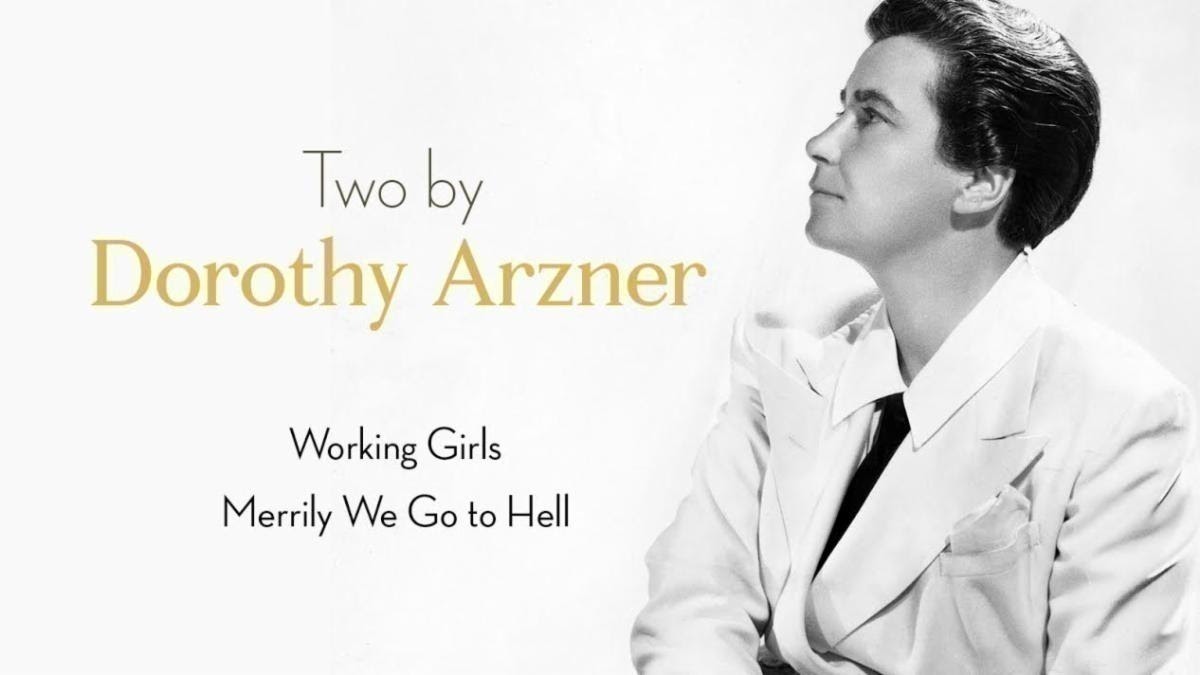
Two by Dorothy Arzner
Featuring a documentary on Arzner by Katja RaganelliThe only woman to work as a director within the studio system of 1930s Hollywood, Dorothy Arzner was a trailblazer whose fascinating, often subversive films were the product of a sophisticated, queer, protofeminist sensibility that managed to assert itself in spite of the limitations of commercial moviemaking. These pre-Code gems are two of her finest and most neglected films.
Featuring: Working Girls (1931), Merrily We Go to Hell (1932)
THURSDAY, SEPTEMBER 3
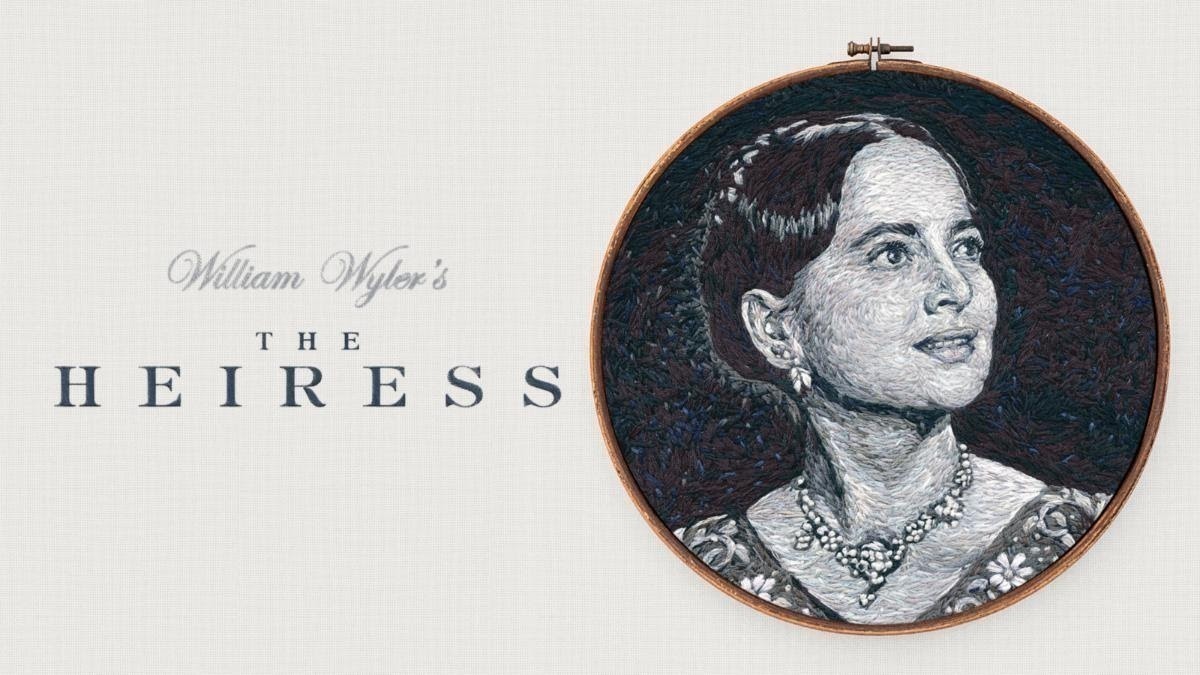
The Heiress (William Wyler, 1949)
Criterion Collection Edition #974
FRIDAY, SEPTEMBER 4
Double Feature: Spaghetti alla Samurai
Yojimbo and A Fistful of DollarsA Japanese chanbara classic inspires a landmark Spaghetti western—and, in turn, a transnational lawsuit—in this one-two punch of visually spectacular action mayhem.
SATURDAY, SEPTEMBER 5

Saturday Matinee: Duck Soup
The marvelous Marx Brothers are at their anarchic best in this wildly hilarious tour de force of comic invention, featuring outlandish musical numbers, some of Groucho’s most priceless one-liners, and the pure genius of the classic mirror scene, a wordless, three-minute slice of slapstick perfection.
SUNDAY, SEPTEMBER 6

Pre-Code Joan Blondell
Featuring a new introduction by critic Imogen Sara SmithClassic Hollywood’s consummate scene-stealing sidekick, Joan Blondell enjoyed a successful screen career for nearly five decades, but it was during the anything-goes pre-Code era of the early 1930s—when dames, gold diggers, and good-time girls were cinematic staples—that she reached her zenith. Whether lending snappy comedic support to a dramatic heavy hitter like Barbara Stanwyck in Night Nurse or showing her range playing a mob boss in the all-too-rare starring vehicle Blondie Johnson, Blondell exuded an irresistible, naughty-but-nice irreverence that was pure pre-Code.
Featuring: Blonde Crazy (Roy Del Ruth, 1931), Millie (John Francis Dillon, 1931), Night Nurse (William A. Wellman, 1931), The Public Enemy (William A. Wellman, 1931)*, Big City Blues (Mervyn LeRoy, 1932), The Crowd Roars (Howard Hawks, 1932), Lawyer Man (William Dieterle, 1932), Three on a Match (Mervyn LeRoy, 1932), Union Depot (Alfred E. Green, 1932), Blondie Johnson (Ray Enright, 1933), Footlight Parade (Lloyd Bacon, 1933), Gold Diggers of 1933 (Mervyn LeRoy, 1933), Dames (Ray Enright and Busby Berkeley, 1934), He Was Her Man (Lloyd Bacon, 1934)
MONDAY, SEPTEMBER 7

Three by Robert Greene
The line between performance and reality is scrambled to provocative effect in the adventurous nonfiction psychodramas of Robert Greene. While the bravura hybrid works Actress and Kate Plays Christine are slippery, multilayered investigations of the craft of acting, Greene’s latest film, Bisbee ’17, uses historical reenactment to connect a shameful chapter of American history to the country’s present. Opening up complex questions about the very meaning of “truth” in documentary, Greene’s fascinating films are alchemical collaborations between director and subject in which artifice is a means to reach authentic human insight.
Featuring: Actress (2014), Kate Plays Christine (2016), Bisbee ’17 (2018)
TUESDAY, SEPTEMBER 8
Short + Feature: Through Her Eyes
Nettles and It Felt Like Love
Featuring a new interview with Nettles director Raven JacksonTwo powerfully intimate films explore the incidents, large and small, that shape young women’s lives as they embrace and explore their sexuality.
WEDNESDAY, SEPTEMBER 9

Four Films by Janicza Bravo
Featuring a conversation between Bravo and Sam Fragoso, host of the podcast Talk EasyThe director of the audacious festival hit Lemon and the highly anticipated Zola, Janicza Bravo’s work cultivates the unsettling, the absurd, and the hilariously warped. Centered around terminally awkward misfits so cringe-inducing that you can’t look away, Bravo’s surreal, stylistically brash films are by turns bleak and bitingly funny commentaries on loneliness, privilege, and the search for human connection. This selection of four of her brilliantly outré shorts showcases the singular, gonzo sensibility that has made her one of American independent cinema’s most exciting voices.
Featuring: Gregory Go Boom (2013), Pauline Alone (2014), Woman in Deep (2016), Man Rots from the Head (2017)
THURSDAY, SEPTEMBER 10

Christo and Jeanne-Claude
Environmental-art superstar Christo, who passed away in May this year, and his longtime collaborator, Jeanne-Claude, transformed the world’s landscapes into epic canvases for their awe-inspiring site-specific installations. Though their staggering achievements—including an enormous curtain hung between two Colorado mountains and a floating fabric walkway built on an Italian lake—were designed to be ephemeral, they frequently inspired filmmakers, particularly documentary masters Albert and David Maysles, to preserve their creations on celluloid. Films like Running Fence, which depicts the artists’ struggle to build a twenty-four-mile fence out of white nylon fabric, and The Gates, about their decades-in-the-making dream to construct a “golden river” of portals in New York’s Central Park, capture the monumental vision, superhuman determination, and unique relationship that drove an extraordinary artistic partnership.
Features: Running Fence (Albert Maysles, David Maysles, and Charlotte Zwerin, 1977), Islands (Albert Maysles, David Maysles, and Charlotte Zwerin, 1987), Christo in Paris (Albert Maysles, David Maysles, Deborah Dickson, and Susan Froemke, 1990), Umbrellas (Albert Maysles, Henry Corra, and Grahame Weinbren, 1994), The Gates (Albert Maysles, David Maysles, Antonio Ferrera, and Matthew Prinzing, 2008), Walking on Water (Andrey Paounov, 2019)
Short: Christo’s Valley Curtain (Albert Maysles, David Maysles, Ellen Giffard, 1974)
FRIDAY, SEPTEMBER 11

Double Feature: Tears of a Clown
Lenny and Jo Jo Dancer, Your Life is CallingIt’s no laughing matter: these two unflinching films delve into the self-destructive dark sides of a pair of comedy legends. In Lenny, Bob Fosse directs Dustin Hoffman in a jagged portrait of Lenny Bruce. Then, Richard Pryor draws on his own personal demons in the autobiographical Jo Jo Dancer, Your Life is Calling, the only narrative feature written and directed by the comedy great.
SATURDAY, SEPTEMBER 12
Saturday Matinee: The Phantom Tollbooth
What could possibly be inside that gigantic, wrapped-and-ribboned box? A tollbooth, a toy car, and adventure! Ride with young Milo through the phantom tollbooth that takes him from the streets of San Francisco into a magical, musical tale of warring kingdoms (one favors words, the other numbers), demons, princesses, and fabulously fantastical creatures—including a tick-tick-ticking “watch” dog!
SUNDAY, SEPTEMBER 13

Directed by Albert Brooks
It’s apt that director, writer, and actor Albert Brooks should have been born Albert Einstein, since his cutting, cerebral, and brutally honest comedies are works of self-deprecating genius. Unafraid of playing unlikable, self-absorbed characters and of putting his own neuroses and obsessions under the microscope, Brooks has directed only a handful of films since the late 1970s, but each is a brilliant, unsparingly funny dissection of the frustrations of the contemporary everyman. Whether satirizing the complexities of dating in Modern Romance, Reagan-era yuppie excess in Lost in America, or the pitfalls of family ties in Mother, Brooks probes the foibles and fallibility of the human condition with a sharp observational eye and sardonic wit that’s as painful as it is hilarious.
Featuring: Real Life (1979), Modern Romance (1981), Lost in America (1985), Defending Your Life (1991), Mother (1996)
MONDAY, SEPTEMBER 14

Art and Craft**
Discover the stranger-than-fiction true story of Mark Landis, one of history’s most prolific art forgers who deceives in the name of philanthropy. What begins as a gripping cat-and-mouse art caper, rooted in questions of authorship and authenticity, gradually develops into an intimate story of obsession and the universal need for community, appreciation, and purpose.
TUESDAY, SEPTEMBER 15

Short + Feature: The Dakar Connection
A Thousand Suns and Touki BoukiLife imitates art as a rising auteur pays homage to a landmark work by her uncle in this snapshot of Senegalese cinema past and present.
WEDNESDAY, SEPTEMBER 16

Three by Lucrecia Martel
You can feel the heat in the swelteringly sensorial films of Argentine iconoclast Lucrecia Martel, who, working in a cinematic vocabulary all her own, creates tantalizingly elliptical, shrewdly incisive commentaries on class, religion, and social hierarchy that have established her as one of the twenty-first century’s major filmmakers. In her early critical triumphs La Ciénaga and The Headless Woman, Martel introduced a startlingly original, fully formed sensibility, marked by off-kilter compositions, a tactile sense of atmosphere, and a caustic perspective on the hypocrisies of Argentina’s bourgeoisie. With her latest feature, the hallucinatory literary adaptation Zama, Martel translates her singular vision to the eighteenth century, losing none of her eccentric edge and acerbic bite.
Featuring: La Ciénaga (2001), The Headless Woman (2008), Zama (2017)
Observations on Film Art #38: Visual Strategies in La Ciénaga
From the very first shot of La Ciénaga, Argentine auteur Lucrecia Martel laid claim to a distinctive, defiantly strange cinematic syntax unlike any other. In this edition of Observations on Film Art, Professor Kristin Thompson examines the surprising choices—uncomfortably tight framing, unusual camera positions, and soft- and out-of-focus lensing—that Martel uses to keep the identities of and relationships between her characters intriguingly opaque and to heighten the film’s stinging critique of bourgeois torpor.
THURSDAY, SEPTEMBER 17

Boyhood (Richard Linklater, 2014)**
Criterion Collection Edition #839
FRIDAY, SEPTEMBER 18
Double Feature: Paradises Lost
Tabu: A Story of the South Seas and Tabu**The shadow of a silent-cinema masterpiece looms large over a twenty-first-century marvel in two visually stunning sagas of doomed passion and colonial tragedy.
SATURDAY, SEPTEMBER 19

Saturday Matinee: Charlotte’s Web**
The most popular children’s book of all time made it to the screen with E. B. White’s heartwarming vision fully intact courtesy of animation powerhouse Hanna-Barbera and the vocal talent of Debbie Reynolds.
SUNDAY, SEPTEMBER 20

The Films of Agnès Varda
Featuring extensive supplemental features from Criterion’s The Complete Films of Agnès Varda box setA founder of the French New Wave who became an international art-house icon, Agnès Varda was a fiercely independent, restlessly curious visionary whose work was at once personal and passionately committed to the world around her. In an abundant career in which she never stopped expanding the notion of what a movie can be, Varda forged a unique cinematic vocabulary that frequently blurs the boundaries between narrative and documentary, and entwines loving portraits of her friends, her family, and her own inner world with a social consciousness that was closely attuned to the 1960s counterculture, the women’s liberation movement, the plight of the poor and socially marginalized, and the ecology of our planet. This comprehensive collection is a testament to the radical vision, boundless imagination, and radiant spirit of a true original for whom every act of creation was a vital expression of her very being.
Features: La Pointe Courte (1955), Cléo from 5 to 7 (1962), Le bonheur (1965), Les créatures (1966), Lions Love (. . . and Lies) (1969), Daguerréotypes (1975), One Sings, the Other Doesn’t (1977), Mur Murs (1981), Documenteur (1981), Vagabond (1985), Jane B. par Agnès V. (1988), Kung-Fu Master! (1988), Jacquot de Nantes (1991), The Young Girls Turn 25 (1993), One Hundred and One Nights (1995), The World of Jacques Demy (1995), The Gleaners and I (2000), The Gleaners and I: Two Years Later (2002), The Beaches of Agnes (2008), Agnès de ci de là Varda (2011), Varda by Agnès (2019)
Shorts: Du coté de la côte (1958), L’opera-mouffe (1958), O saisons, o chateaux (1958), Les fiancés du Pont Macdonald (1962), Salut les cubains! (1964), Elsa la rose (1966), Uncle Yanco (1968), Black Panthers (1970), Réponse de femmes (1975), Plaisir d’amour en Iran (1977), Ulysse (1982), Les dites cariatides (1984), 7 p., cuis., s. de b. . . . (à saisir) (1985), T’as des beaux escaliers, tu sais (1986), Le lion volatil (2003), Ydessa, les ours, et etc. . . . (2004), Les 3 boutons (2015)
MONDAY, SEPTEMBER 21
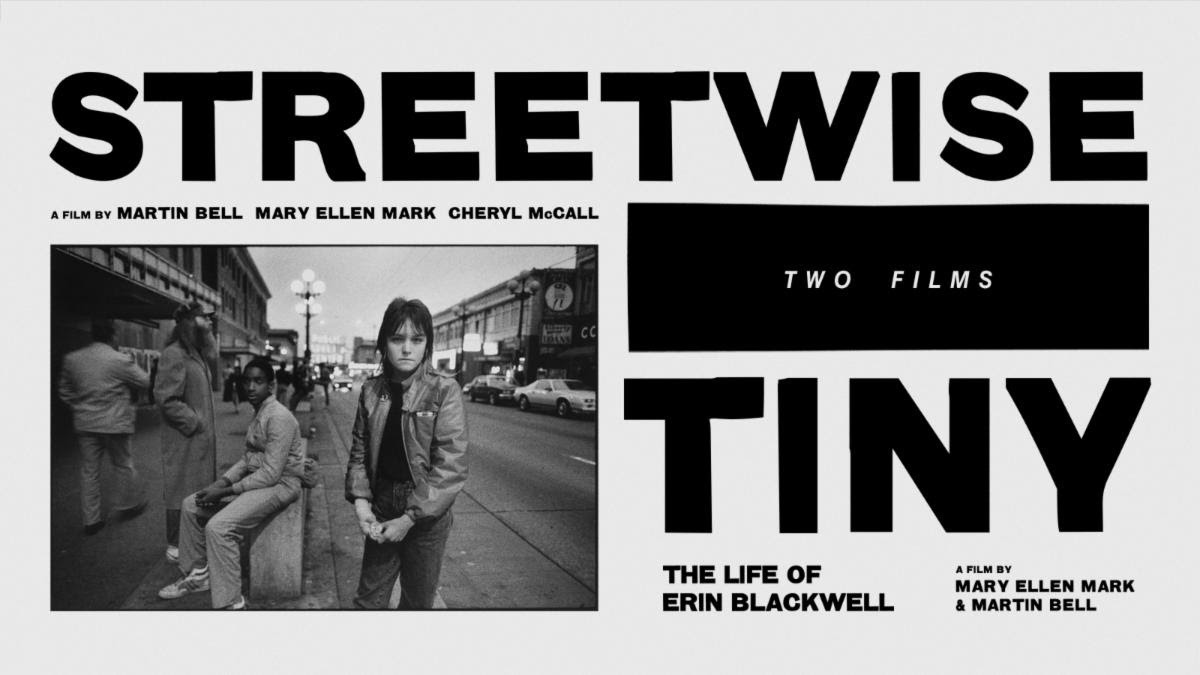
Streetwise and Tiny: The Life of Erin Blackwell
Featuring a new introduction with director Martin BellIn 1983, filmmaker Martin Bell, photographer Mary Ellen Mark, and journalist Cheryl McCall set out to tell the stories of those society had left behind: homeless and runaway teenagers living on the margins of Seattle. The resulting Academy Award–nominated documentary landmark Streetwise follows an unforgettable group of children who, driven from their broken homes, survive by hustling, panhandling, and dumpster diving. Among the project’s most haunting and enduring faces was Tiny, an iron-willed fourteen-year-old who the filmmakers would continue to track for the next thirty years.
TUESDAY, SEPTEMBER 22
Short + Feature: All by Myself
The Amateurist and Je tu il elleTwo fearless filmmakers turn the camera on themselves to explore loneliness, solitude, identity, sexuality, and the gaze within self-engineered confines of their own making.
WEDNESDAY, SEPTEMBER 23

Thank You and Good Night
Featuring two short films and a new introduction by director Jan OxenbergA lost-and-found revelation from indie film and TV maverick Jan Oxenberg, Thank You and Good Night is a docu-fantasy narrative focused on the filmmaker’s hilarious, messy, Jewish family as they prepare to say goodbye to someone they love. An early Sundance hit but virtually unseen for decades, the film reemerges as a singular, uncategorizable exploration of the meaning of life, death, and the tangled stuff that is a family. This key touchstone in the evolution of the autobiographical documentary has reemerged thanks to a new restoration and is presented alongside two early short works by Oxenberg that offer a wittily satirical perspective on her experiences growing up as a lesbian.
Feature: Thank You and Good Night (1992)
Shorts: Home Movie (1973), A Comedy in Six Unnatural Acts (1975)
THURSDAY, SEPTEMBER 24

Corpus Christi
Streaming premiereAnchored by a stunning performance from newcomer Bartosz Bielenia, this moral tinderbox is an emotionally gripping, darkly humorous portrait of a man on a most curious road to redemption following his release from a Warsaw prison for a violent crime.

Directed by Volker Schlöndorff
Though he would find himself at the forefront of the radical New German Cinema movement, Volker Schlöndorff got his training from French trailblazers such as Alain Resnais, Jean-Pierre Melville, and Louis Malle, and he became fascinated by the possibilities of filmmaking as a political tool early in his career. After his 1966 debut, the political allegory Young Törless, more stinging commentaries on the state of Germany-then-and-now followed in the seventies: The Lost Honor of Katharina Blum (codirected with Margarethe von Trotta), Coup de grâce, and his grandest success, the Oscar- and Palme d’or–winning The Tin Drum. Continuing to delve into the traumas of the mid-twentieth century in late-career triumphs like The Ogre and Diplomacy, Schlöndorff looks unflinchingly to the past in order to illuminate the present.
Featuring: Young Törless (1966), Baal (1970), The Lost Honor of Katharina Blum (Volker Schlöndorff and Margarethe von Trotta, 1975), Coup de grâce (1976), The Tin Drum (1979), Circle of Deceit** (1981), Swann in Love (1984), Death of a Salesman (1985), The Handmaid’s Tale (1990), Voyager (1991), The Ogre (1996), The Legend of Rita** (2000), Diplomacy** (2014)
FRIDAY, SEPTEMBER 25
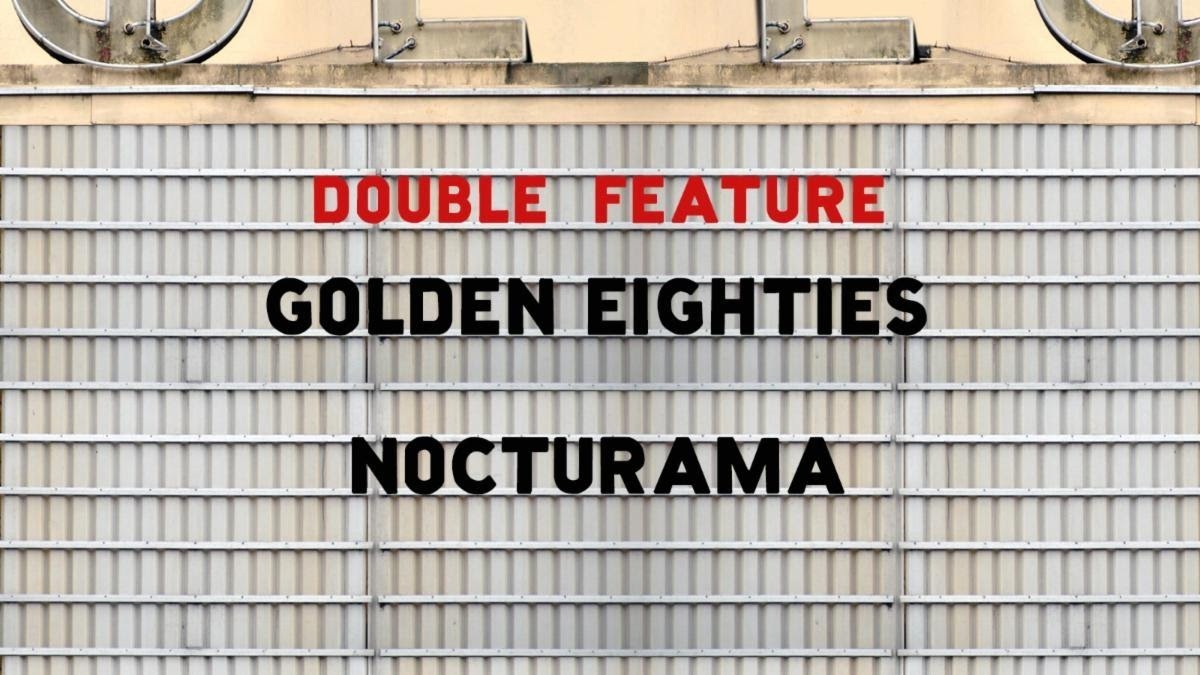
Double Feature: Mall Wonders
Golden Eighties and Nocturama
Featuring a new interview with Nocturama director Bertrand Bonello, whose film Zombi Child is also now playing on the ChannelDon’t look for retail therapy in this pair of super-stylized, shopping-mall-set genre-exploders that balance sleek pop pleasures with a subversive anticapitalist critique.
SATURDAY, SEPTEMBER 26
Saturday Matinee: Pygmalion
Cranky Professor Henry Higgins (Leslie Howard) takes a bet that he can turn Cockney guttersnipe Eliza Doolittle (Wendy Hiller) into a “proper lady” in a mere six months in this delightful comedy of bad manners, based on the play by George Bernard Shaw.
SUNDAY, SEPTEMBER 27

By the Book
You’ve read—or at least meant to read—the book. Now see the movie. Just in time for the start of school, we’ve collected some of the all-time great page-to-screen adaptations, encompassing English 101 classics like Great Expectations and Lord of the Flies, world-literature masterpieces like War and Peace and Pather Panchali, modern best sellers like The Virgin Suicides and The Hours, and more. While faithful transpositions abound, there are plenty of surprising spins on canonical titles, such as Akira Kurosawa’s Japan-set retelling of Fyodor Dostoyevsky’s The Idiot, John Huston’s hallucinatory take on Malcolm Lowry’s “unfilmable” Under the Volcano, and Chantal Akerman’s fascinating postcolonialist reimagining of Joseph Conrad’s Almayer’s Folly. Each is a distinguished work of art in its own right, as worthy of appreciation as its celebrated source.
Featuring: The Count of Monte Cristo (Rowland V. Lee, 1934), The 39 Steps (Alfred Hitchcock, 1935), La bête humaine (Jean Renoir, 1938), Of Mice and Men (Lewis Milestone, 1939), Great Expectations (David Lean, 1946), The Killers (Robert Siodmak, 1946), Anna Karenina (Julien Duvivier, 1948), Oliver Twist (David Lean, 1948), The Heiress (William Wyler, 1949), The Passionate Friends (David Lean, 1949), The Idiot (Akira Kurosawa, 1951), The Life of Oharu (Kenji Mizoguchi, 1952), Robinson Crusoe (Luis Buñuel, 1954), Senso (Luchino Visconti, 1954), Pather Panchali (Satyajit Ray, 1955), Aparajito (Satyajit Ray, 1956), The Burmese Harp (Kon Ichikawa, 1956), Apur Sansar (Satyajit Ray, 1959), The Cloud-Capped Star (Ritwik Ghatak, 1960), Purple Noon (René Clément, 1960), Zazie dans le métro (Louis Malle, 1960), Divorce Italian Style (Pietro Germi, 1961), Lord of the Flies (Peter Brook, 1963), Tom Jones (Tony Richardson, 1963), Charulata (Satyajit Ray, 1964), Woman in the Dunes (Hiroshi Teshigahara, 1964), Closely Watched Trains (Jirí Menzel, 1966), War and Peace (Sergei Bondarchuk, 1966), Memories of Underdevelopment (Tomás Gutiérrez Alea, 1968), The Angel Levine (Ján Kadár, 1970), Dodes’ka-den (Akira Kurosawa, 1970), The Phantom Tollbooth (Chuck Jones, Abe Levitow, and Dave Monahan, 1970), The Little Prince (Stanley Donen, 1974), Picnic at Hanging Rock (Peter Weir, 1975), The American Friend (Wim Wenders, 1977), The Ascent (Larisa Shepitko, 1977), The Getting Of Wisdom (Bruce Beresford, 1977), Empire of Passion (Nagisa Oshima, 1978), Watership Down (Martin Rosen, 1978), My Brilliant Career (Gillian Armstrong, 1979), Stalker (Andrei Tarkovsky, 1979), The Tin Drum (Volker Schlöndorff, 1979), Wise Blood (John Huston, 1979), You Are Not I (Sara Driver, 1981), Under the Volcano (John Huston, 1984), Mishima: A Life in Four Chapters (Paul Schrader, 1985), My Life as a Dog (Lasse Hallström, 1985), Betty Blue (Jean-Jacques Beineix, 1986), An Angel at My Table (Jane Campion, 1990), The Comfort of Strangers (Paul Schrader, 1990), Europa Europa (Agnieszka Holland, 1990), The Handmaid’s Tale (Volker Schlöndorff, 1990), Emily Brontë’s Wuthering Heights (Peter Kosminsky, 1992), The Castle (Michael Haneke, 1997), The Sweet Hereafter (Atom Egoyan, 1997), The Virgin Suicides (Sofia Coppola, 1999), The Piano Teacher (Michael Haneke, 2001), The Hours (Stephen Daldry, 2002), Gomorrah (Matteo Garrone, 2008), Almayer’s Folly (Chantal Akerman, 2011), 45 Years (Andrew Haigh, 2015), Certain Women (Kelly Reichardt, 2016), Zama (Lucrecia Martel, 2017)
MONDAY, SEPTEMBER 28

The Prison in Twelve Landscapes
The contemporary American police state shapes almost every aspect of society—whether we’re aware of it or not. Without ever venturing inside a penitentiary, director Brett Story excavates the insidious, often-unseen influence that prisons—and the American system of mass incarceration—has on communities and industries all around us.
TUESDAY, SEPTEMBER 29

Short + Feature: All This Jazz
When It Rains and Ornette: Made in AmericaTwo jazz-inflected riffs by legendary American independent filmmakers make sweet music together in this double feature in double time.
WEDNESDAY, SEPTEMBER 30
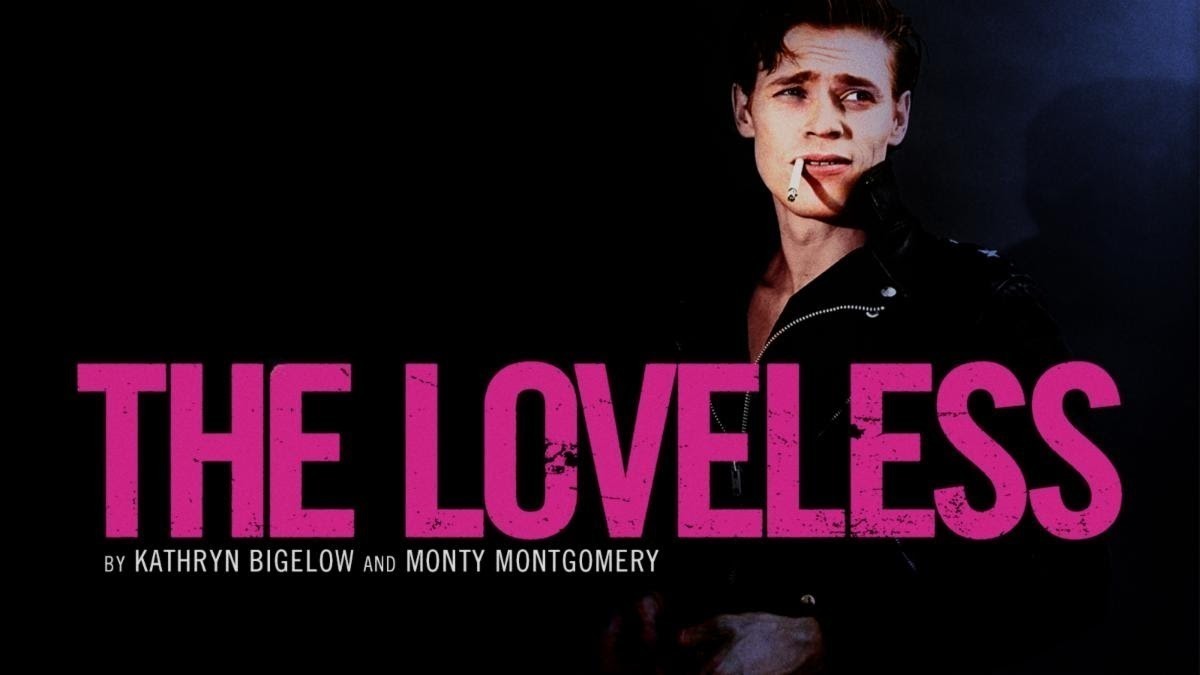
The Loveless
The first feature by both acclaimed director Kathryn Bigelow and future David Lynch producer Monty Montgomery, as well as the screen debut of star Willem Dafoe, this edgy, should-be cult classic puts a furiously subversive spin on the rebel biker films of the 1950s.



